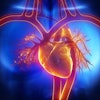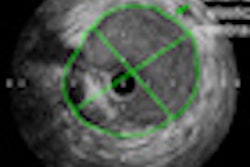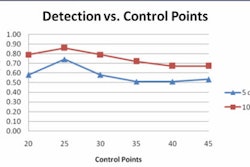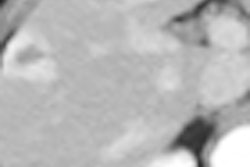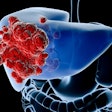Adverse cardiac events are rare in patients with low- to moderate-risk chest pain in the 12 months following a negative cardiac CT angiogram (CTA), according to a small study in the October issue of the American Journal of Roentgenology.
By using negative CTA exams to determine if a patient can safely receive an early discharge, emergency departments can save a substantial amount of cost and time and alleviate department congestion, researchers at the University of Washington School of Medicine in Seattle concluded. The lead author of the study was William Shuman, MD, from the department of radiology (AJR, October 2010, Vol. 195:4, pp. 923-927).
Initially, 81 consecutive patients were enrolled in the study after evaluation for low- to moderate-risk chest pain in the university's emergency department. The patients received a cardiac CT angiogram as part of their workup and agreed to have follow-up for one year.
Emergency department patients
Patients who presented with heart rates greater than 55 beats per minute were given 50 to 100 mg of oral beta-blocker 45 to 60 minutes before the CT examination. CT exams were performed on a 64-slice CT scanner (LightSpeed VCT XT, GE Healthcare, Chalfont St. Giles, U.K.), using retrospective gating in 46 cases and prospective triggering for 35 patients.
Eleven patients were later excluded from the study. Six patients were eliminated due to either an uninterpretable cardiac CTA scan, the inability to bring a patient's heart rate down to less than 75 beats per minute with beta-blockers, lost images, or missed bolus timing.
Four other patients were excluded because of positive cardiac CTA results, which showed stenosis of greater than 50%. Three of the four patients received cardiac catheterizations and a stent, and one had negative stress echocardiography. One patient was lost to follow-up but did not appear in the Social Security Death Index.
The final patient population included 70 patients (40 men and 30 women; mean age, 54 years) with negative cardiac CTA scans and stenosis of less than 50%. The CTA images revealed that 40 patients had no cardiac disease, no patients had plaque without stenosis, 19 patients had plaque with 1% to 29% stenosis, and 11 patients had 30% to 49% stenosis.
Detailed follow-up
The researchers followed the 70 patients with detailed interviews at three, six, and 12 months to ask about intervening cardiac events, diagnostic testing, and therapy.
In the follow-up analysis, none of the 70 patients reported a subsequent adverse cardiac event during the 12-month follow-up period. Adverse cardiac events were defined as myocardial infarction, coronary artery stenting, bypass surgery, or death. In addition, no patients reported a follow-up diagnosis of ischemic cardiac disease.
Also, at the one-year follow-up, researchers were unable to determine the cause of the original chest pain in 49 patients. The group found gastrointestinal conditions for the chest pain in nine patients, anxiety as the cause in seven patients, musculoskeletal factors in three patients, one patient with an adverse reaction to medication, and one patient with chest pain due to asthma or airway disease.
Patient diagnosis after 12 months
|
||||||||||||||
| Source: American Journal of Roentgenology |
Based on the results, Shuman and colleagues concluded that for patients "with low- to moderate-risk chest pain evaluated in the emergency department, adverse cardiac events may be rare during the year after negative cardiac CTA scan."
The authors cited several limitations to the study, including a "relatively small" patient sample. "This single-center study should be validated in a larger multicenter trial," they noted.
By Wayne Forrest
AuntMinnie.com staff writer
September 21, 2010
Related Reading
CT angiography gets nod for neonates with heart disease, August 26, 2010
AHA endorses cardiac CT for low-risk patients, August 24, 2010
ASIR cuts dose by 27% in coronary CT angiography, August 20, 2010
Enhanced reference standard boosts CTA accuracy, August 4, 2010
Supersized CONFIRM trial tackles coronary CTA and mortality, July 30, 2010
Copyright © 2010 AuntMinnie.com



